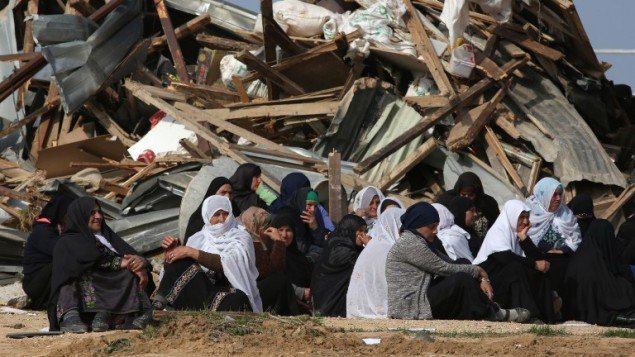Tu B’shvat in the Negev
Many years ago, in ancient Israel, Choni the Circle Maker was walking along the road. He passed an old woman planting a carob tree and asked her, why she plants a tree from which she will never taste fruit? The old woman replied, "I myself found fully grown carob trees in the world; as my forebears planted for me, so am I planting for my children.”
For past five months in Israel I've been wisdom planting, shoveling into deep religious and political soil. In my Talmud class, I'm digging through tractate avodah zara, idol worship, learning intimately the way the rabbis of old coped with living in diversity. When I step outside of the beit midrash, I marvel at how little we have learned over the centuries. I look out from my cushy neighborhood in the German Colonty towards east Jerusalem, and read American news of constitutional violations and protests, and it seems clear to me that the world is becoming more and more divided, people less willing to partner across the aisle. The Talmudic rabbis had their own guidelines for how to separate themselves and isolate themselves from unwelcome ideas and practices. We likely tend to surround ourselves with those who share our ideals and sensibilities, and block out those who differ.
After Choni speaks with the old woman, he falls asleep for seventy years by the sapling she planted. We can imagine the years spinning by the sleeping Choni, people planting and harvesting a lifetime’s worth of fruit around him. But when Choni awakens, he is unaware of it all—he sees only the carob tree, now grown, and so much has changed. The new world Choni wakes up to is too much for him to bear, and he dies.
I know that moment of despair when Choni gives up. Sometimes the pain of the world lays heavy on my heart and my conscience, and it’s overwhelming, and it seems like nothing can be done. But I cannot choose Choni’s response, because that would be the end. I want to be like the woman in the story, thrusting my hands into the dirt to ensure a future for myself and my children. I know that some of seeds I plant today will bear fruit for generations. After all, the more we sow, the more we can grow.
Tomorrow is Tu B'shvat. The Jerusalem grocery stores are full of fresh fruits, and my oud teacher has assigned me special piyutim to learn for the holiday. But unlike the Israeli school children, who are going on trips to the park and learning the names of trees in the Torah, I will be spending my Tu Bshvat in the Bedouin village of Umm Al Hiran. The Israeli government has been attempting to demolish this village of Israeli citizens in order to build a town for religious Jews in the negev. (From what I’ve learned, this is in part a political response to the Amona evacuation, in order to appease the settler community which feels that non-Jews shouldn’t be settling land in Israel). A recent demolition clash has made its way into headlines around the world, in which a Bedouin Israeli resident and a Jewish Israeli police officer were killed. I am sure our visit tomorrow will be heavy with the loss of a member of Umm Al Hiran’s community, and it will be hard to witness the homes that have been demolished. I hope that our presence there, and planting olive and fruit trees with the village, will help their cause and show them that there are people on their side.
Bedouin women react to the destruction of houses on January 18, 2017, in the unrecognized Bedouin village of Umm al-Hiran in the Negev desert. (AFP Photo/Menahem Kahana)
Now, when I read the story of Choni, I see an ancient text speaking to an ongoing truth: we live in complicated space and time, and often feel discordance between what we see and what we imagine the world could be. I don’t know whether the coming months and years will bring the world closer or farther from its potential. But I do know that I am committed to the future, and I believe in fighting for the rights of the disenfranchised, in building bipartisanship and tolerance, and in fostering spiritual resilience in the face of hate and fear. I am committed to keeping my eyes open and my hands dirty. I have seeds in my hands, and I am not alone.
May your Tu B'shvat be full of nature, celebration, and looking towards the future.

